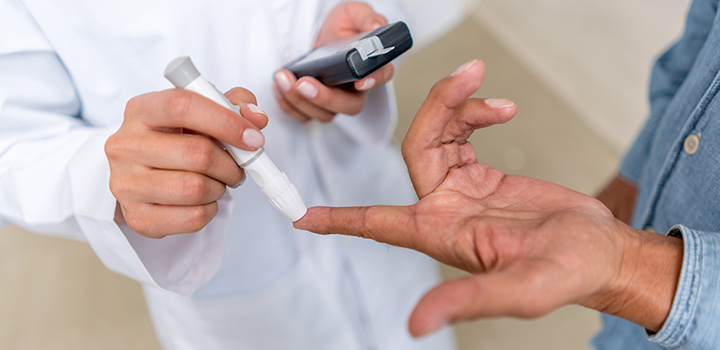Five myths about diabetes

The number of people with type 2 diabetes is increasing in every country, and the World Health Organization predicts that diabetes will be the seventh leading cause of death worldwide in 2030.
Chances are relatively high that you or your employees could be pre-diabetic or already suffer from the condition. Here are five common myths about diabetes:
1. Type 2 diabetes is "not so bad"
A common myth about diabetes is that type 1 is the "bad" kind of diabetes and that type 2 is the less serious or "good" kind. It's not clear where this idea started, but it could be our fear of needles. People with type 1 diabetes need insulin injections to control their blood sugar while people with type 2 diabetes can usually control their blood sugar with oral medicine and lifestyle changes, or even by lifestyle changes alone.
However, some people with type 2 diabetes also have to inject themselves with insulin as diabetes can worsen over time. Both types of diabetes can lead to serious health complications, such as heart disease, stroke, blindness, kidney failure, and nerve damage that can result in having to amputate limbs.
2. Slender people can't get type 2 diabetes
Being overweight is a major risk factor for developing type 2 diabetes. Being even slightly overweight increases diabetes risk by up to five times, according to research done by Harvard School of Public Health Professor Walter Willett.
But being overweight is not the only major risk factor for type 2 diabetes. Genetics are just as important. People with a family history of diabetes are at higher risk for both type 1 and type 2 diabetes. Smoking also increases the risk of diabetes and cardiovascular diseases.
On the 'supply side' of the healthcare system, a major driver of costs is the rapid emergence of new medicines and medical technologies. Unlike information technology, new technology in healthcare comes at a typically much higher cost. In 2016, Discovery Health Medical Scheme paid out more than R1.5 billion for high-cost medicines, up from R400 million in 2008. In 2016, 89 members requiring very high-cost medicines claimed an average of R1.4 million each, and the number of members requiring these high-cost medicines has increased seven-fold since 2008.
3. People with diabetes have to eat small, frequent meals
If you have low blood sugar, you have to eat frequently to keep your blood sugar stable. It's easy to assume that anyone with diabetes has to eat small meals and snacks to keep them going. Unfortunately, it's not that simple.
Both high blood sugar (hyperglycaemia) and low blood sugar (hypoglycaemia) are common in people with diabetes. If there is too much glucose in a person's blood, frequent snacking will only make the condition worse. Each person with diabetes has to have their own eating plan that works for their bodies. This can involve anything from regular small meals to fasting.
4. Eating something really sweet will "give you" diabetes
Type 1 diabetes is genetic and type 2 is influenced by genetics and other factors. About 80% of cases of type 2 diabetes are linked to lifestyle factors. But if you don't have diabetes and only eat something ridiculously sweet every now and then, the sugar won't automatically "give you" diabetes.
This doesn't give you a free pass to indulge. A review of research published in the journal Diabetes Care indicated that people who had one to two servings of soft drinks a day had a 26% greater risk of developing type 2 diabetes than those who had no soft drinks or less than one a month.
5. You can't get type 2 diabetes if you lead a healthy lifestyle
Since 80% of type 2 diabetes is triggered by lifestyle factors, it's easy to assume following a healthy eating plan and exercising regularly means you're immune. Unfortunately, there are other factors that can prevent the pancreas from producing enough insulin or prevent the body from responding to insulin normally.
Some medical conditions, such as polycystic ovarian syndrome (PCOS), increase the risk for type 2 diabetes because it's related to insulin resistance. In PCOS, cysts form in your ovaries, and one possible cause is insulin resistance. You could also develop diabetes if you are involved in an accident that damages your pancreas.
So don't rely on assumptions instead of facts - seek out reputable sources for health information, and if you need help to manage the condition, get guidance from a healthcare professional.
Identifying and proactively supporting your employees
Discovery Healthy Company offers a digitally-enabled, comprehensive employee assistance programme and wellness solution that identifies and proactively supports employees.
This employee assistance programme helps your employees, their partner and anyone living in their household deal with everyday situations and more serious concerns impacting their emotional, financial, physical or legal wellbeing. Our multi-skilled Healthy Company coaches are here to assist your employees every step of the way and we have created a library of information, tools and advice that can be accessed any time.
The Discovery Health Medical Scheme is an independent non-profit entity governed by the Medical Schemes Act, and regulated by the Council for Medical Schemes. It is administered by a separate company, Discovery Health (Pty) Ltd, an authorised financial services provider and administrator of medical schemes.
Related articles
Your diabetes dictionary: A guide to understanding medical jargon
Do you zone out when someone starts using medical jargon? Here are some simple explanations so you can keep yourself in the know with diabetes terminology.
A mom's guide to gestational diabetes
Gestational diabetes can come as a shock to women who've never had any issues with their blood sugar levels before. Here's what expecting parents need to know.
Diabetes and exercise: how, what, when and why
If you're diabetic (or nearing it), you've no doubt heard that regular exercise can reduce your risk. If you're not sure what it entails, here are answers for all your FAQS about exercise!